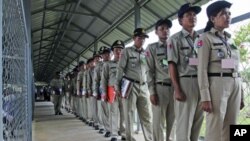The world is watching as citizens in some Middle Eastern countries seek justice against recently toppled leaders of sometimes brutal governments. In Cambodia, the reign of the Maoist Khmer Rouge ended decades ago, but efforts to bring those responsible to justice continue. Three of those facing prosecution may finally face justice after many years in the Khmer Rouge tribunals.
Ta An is accused of being part of a killing campaign during the Khmer Rouge's rule in the late 1970s.
But he denied overseeing genocide. He said he was transferred to Kompong Cham province, where some 150,000 died, after the killing took place.
“When I arrived, that was finished already, from the bottom up to the highest levels. I focused on re-organizing new villages and communes. I was not involved in anything at all,” he said.
Court documents prepared by the Khmer Rouge tribunal list his alleged crimes: forced labor, inhumane living conditions, unlawful arrest and detention, physical and mental abuse, torture and killing.
“At present I am not fearful of the court, and in the future, when I die, I won’t be afraid of Yama [the Buddhist god of the dead]. Not fearful. I am now doing good deeds. I practice religious art. I did not commit killings. But am I afraid of Yama? I am not afraid.”
Im Chaem is accused of being responsible for 40,000 deaths. She said the charges are lies.
“I turn to worry about those who’ve made allegations against me. I don’t know who did this to me. This is a life-and-death issue and involves politics. It is wrong as to what I did and my actions. It is clearly different as the earth and the sky,” she said.
Meas Muth, a former army general, is among those under investigation in the United Nations-backed tribunal's third and fourth cases. He also denied being part of a killing campaign, and said the cases are not valid.
“The law for the prosecution of Khmer Rouge leaders limits to only the senior leaders and the most responsible leaders. Right now they are already there. If they bring more people, it is beyond the law. And if so, it would cause problems to our society and security,” he said.
Muth’s alleged crimes include sending Khmer Rouge members in his division to death at Tuol Sleng prison, known as S-21, a charge he denied. He does admit, though, to some incidents taking place within his ranks.
“There could be some which happened when the General Staff was called to attend a study. Later the unit was informed that certain individuals were not allowed to go back. The General Staff would then send them to S-21.”
Cambodian Prime Minister Hun Sen said he does not want more Khmer Rouge tribunal cases, charging they could destabilize national security. But the tribunal's staff are under international pressure to find justice for the victims many years ago.




